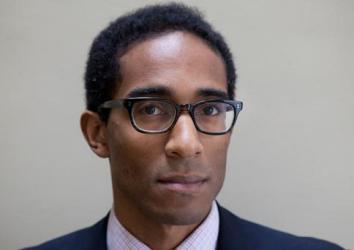Please send your questions for publication to gentlemanscholarslate@gmail.com. Questions may be edited.

Photo by Christina Paige
I recently became an uncle. I have no children of my own and do not know how children work. What, precisely, is the role of an uncle, and what obligations do I have to my new miniature family member?
Mazel tov! Thanks for your question.
The word uncle derives from the Latin avunculus, which means little grandfather and further gives us avuncular—an adjective connoting charmed warmth and nurturing cheer. The etymology hints that an uncle is obliged to dote, perchance to spoil. Depending on certain numbers, such as the child’s age and your bank balance, this might mean leaving the kid a $200 coffee table book—Taschen’s 75 Years of Marvel Comics, say—under the Christmas tree, or just flipping a $10 deck of Spider-Man playing cards into his stocking and giving credit to Santa.
Not incidentally, the word nepotism derives from the Latin nepos, which means nephew. This etymology indicates another set of avuncular duties. It is your job to pull strings and scratch backs in order to ease the child’s access to selective schools, exclusive clubs, competitive internships, and tricky restaurant reservations, all of this pulling and scratching without remorse. Any distaste for such maneuvers is a poor excuse for neglecting to perform them. Uncles harboring principled objections to rigging the system should simply train their nieces and nephews to subvert the Establishment from within, possibly by way of Manchurian Candidate-type programming.
But I’m getting ahead of myself: We’re talking about a child whose brain has not yet developed sufficiently to benefit from a proper washing. The best way for you to embrace uncleship, dear reader, is to babysit. If you live within, say, an hour’s drive or subway ride of your sibling, you should try to schedule a monthly visit: Coo at the kiddie; let his parents put him to bed; sit around watching HBO while they go out on a date. I especially recommend this course of action to an uncle who isn’t necessarily crazy about his sibling’s spouse: It’s a great way to earn gratitude without having to endure his or her company.
As the child grows, keep hanging out with him as frequently as your schedule and your tolerance for diaper-changing allow. Establish rituals, maintain traditions, impart skills, remember preferences, and guide the child’s taste. (If he or she demonstrates an inkling of an interest in anime, your uncling will involve exposing him or her to Hiyao Miyazaki.) An especially fun thing to do is to screen movies featuring bad uncles—the fellows whose lusty usurpations and general creepiness lend a savory something to the classics. A 6-year-old should come to know and fear Disney’s Scar; a 12-year-old, Hitchcock’s Uncle Charlie; an 18-year-old, Shakespeare’s King Claudius.
Spider-Man’s Uncle Ben is quoted saying, “With great power comes great responsibility.” You, new uncle, have great power, by virtue of your distance. As the GS’s pal Kate Bolick has observed of your distaff equivalent, “The aunt exists outside the immediate family unit, ambassador to a universe of other options, as well as—crucially—a grown-up who isn’t an authority figure or disciplinarian.” Your responsibility is to be coolly wise and warmly understanding, to model an enchanting vision of adulthood. Two famous American uncles—the avunculus of the super arachnid and the personification of the republic—have close ties to Benjamin Franklin, and I suggest him, in turn, as a role model for you. I could go on and on about how Franklin, inventive and mischievous, was clearly the most ideally unclelike of the Founding Fathers, but I think you’ve got my gist. So I’ll now demonstrate the second of his 13 virtues, silence: “Speak not but what may benefit others or yourself; avoid trifling conversation.”
As someone who strives for political correctness, I typically wish people “Happy Holidays” in mid- to late December. But sometimes this feels silly and meaningless—like last year, when Hanukkah was over by the end of the first week of December. Plus, I like the warmth and specificity of “Merry Christmas.” When is it OK to say “Merry Christmas,” and when must I stick with the milquetoast, if multi-culti, “Happy Holidays”?
Happy Xmas! Thanks for your question.
Try saying, “Happy Christmas,” on the John-and-Yoko model. Substituting happy for merry shifts the phrase away from the manger into the secular realm.
This time of year probably more than any other, there are people outside malls and other public places asking for donations for various charities. Add to that the buskers playing music as I walk by, the kids selling candy canes, and the panhandlers asking for spare change. I’m no Scrooge, but I can’t give to everyone! I think it’s only fair to give to buskers if I stop to listen/watch, and if I’m hungry and a kid’s selling a candy bar, I’ll go for it. But I prefer to research charities before giving, and I would rather give to an organization that helps the homeless than straight to someone who may use it for drink/drugs (although I will give food). How, when, and to whom should a gentleman give?
Thank you for your question.
Yes, you make good points. Moreover: Is it just me or are the seedier panhandlers getting especially bold this Festivus? I almost appreciated the forthrightness of the guy who made a nonstandard pitch the other night: “Look, I’m not gonna lie to you, bro: I just did a couple bumps and now I’m trying to get a beer. Can you help me out?”
Do not give money to people boasting of their controlled-substance intake. Otherwise, listen to your gut. Ideally, this involves donating to a properly vetted 501(c)(3). I like The Doe Fund.
So you know how around the holidays people are always saying “I overindulged” or making some oblique reference to gaining weight? What’s a dude supposed to say?
Thanks for asking.
“Well, you look great, so let’s change the topic!”